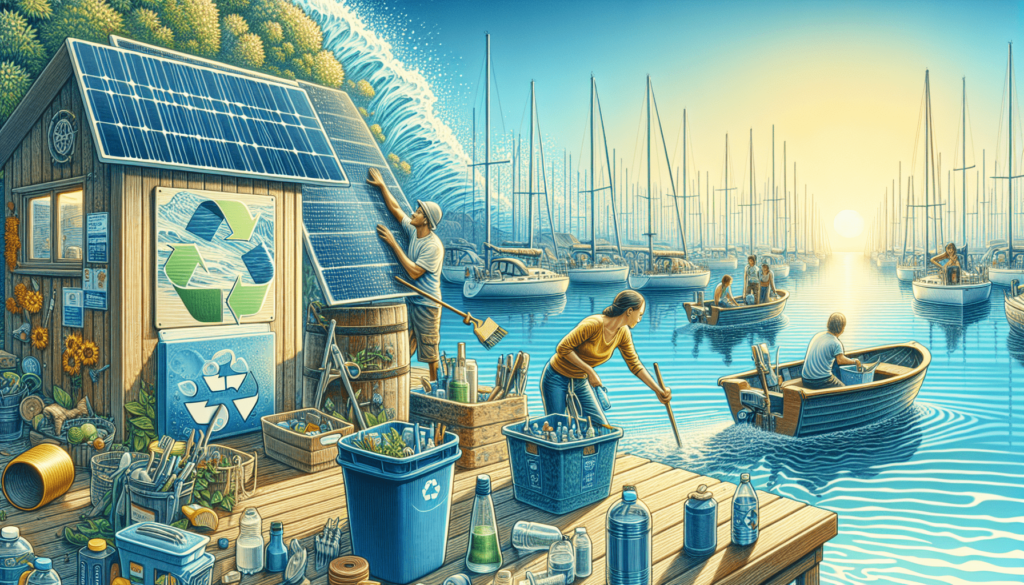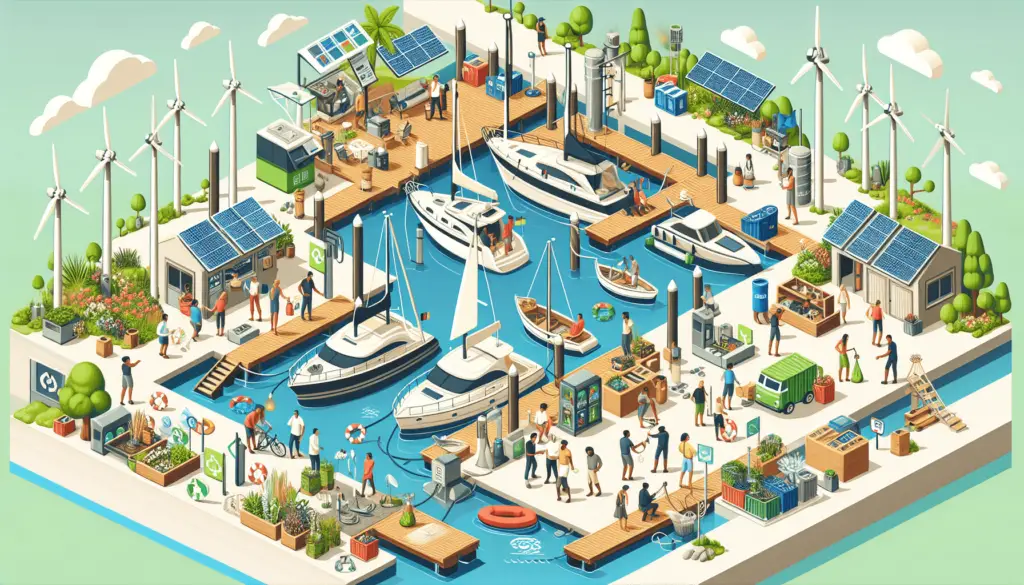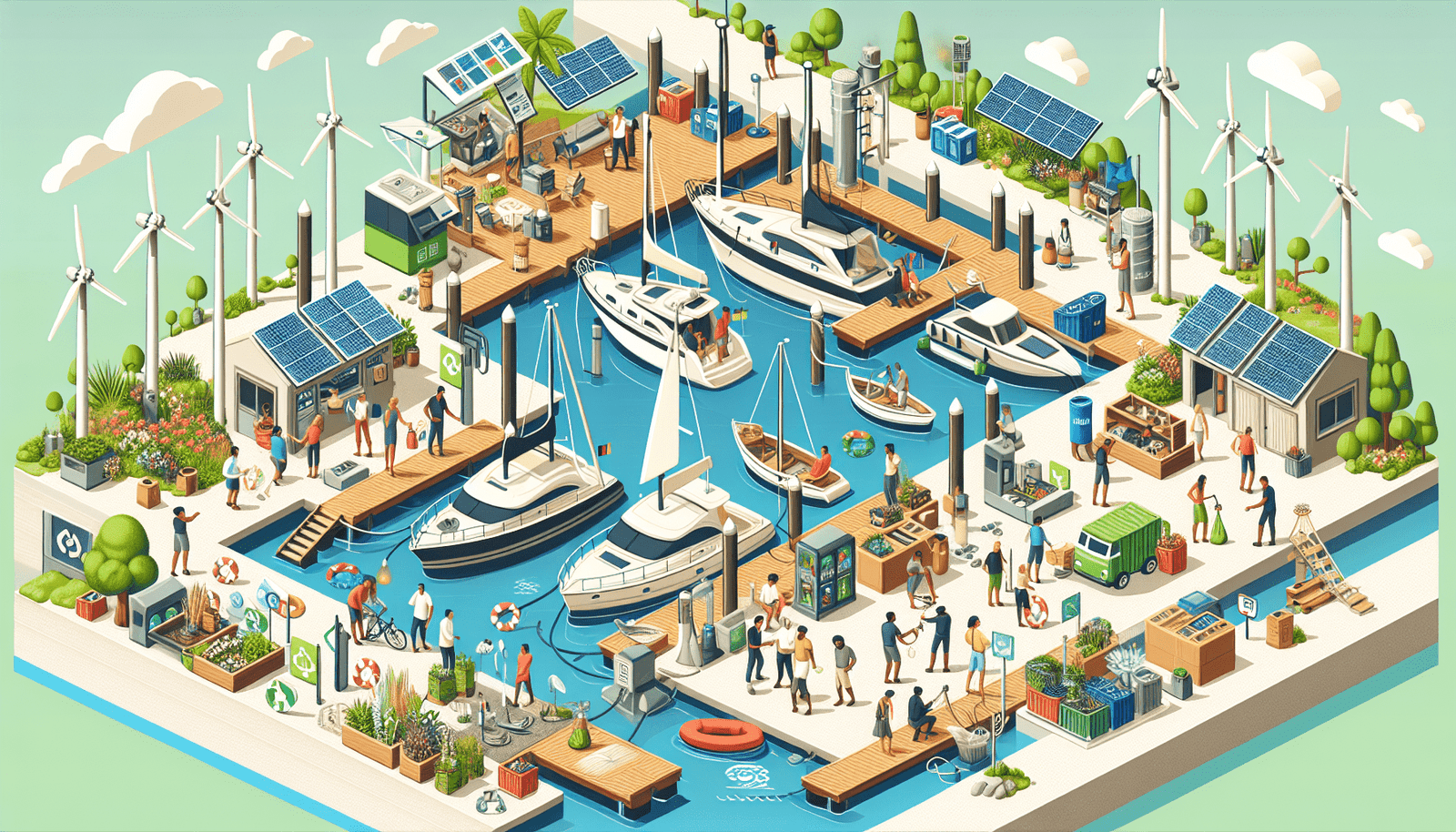Imagine you’re standing at the helm of a sleek boat, feeling the spray of the ocean as you sail toward the horizon. Now, picture that vessel powered by renewable energy, casting no harmful emissions into the environment you’re exploring. No, it’s not a pipe dream. It’s right here, a reality within your grasp. “Leading The Way In Environmental Conservation: A Spotlight On Eco-Friendly Boaters” gives you a scenic ride into the world of these pioneers, showcasing how passionate boaters are setting new standards for eco-conscious seafaring. You’re about to be immersed in adventure stories of environmental saviors, navigating not only the waves of the great oceans but also the pressing challenges of conservation. Ready to hoist your sails and join the journey?

Understanding Eco-Friendly Boating
Definition of eco-friendly boating
Did you know there’s a more environment-conscious way to enjoy boating? It’s called eco-friendly boating. This way of boating is all about minimizing the harmful impact on marine ecology. It incorporates practices that make less use of nonrenewable resources, reduce pollution and waste, and protect marine habitats and creatures.
The importance of environmentally conscious boating practices
Why sweat over eco-friendly boating? Well, boating practices have a significant impact on the environment. By choosing to boat eco-friendly, you contribute to the preservation of clean waters and healthy aquatic ecosystems, which are critical for sustaining a broad range of species, including humans. Plus, it helps comply with environmental regulations and can even save you money!
Why has there been a rising interest in eco-friendly boating
So why are more and more people turning towards eco-friendly boating? Increasing awareness about climate change and the need for sustainable practices is driving this shift. Coupled with innovations and incentives in eco-friendly boating technologies and practices, it’s making it easier for boaters to adopt green boating habits.
Environmental Impact of Traditional Boating Practices
Pollution contribution from conventional boating operations
Conventional boating operations pose a substantial pollution threat. Fuel leakage and exhaust emissions contribute carbon dioxide and other harmful substances into the water and air. Improper disposal of waste and sewage from boats also lead to water pollution, impacting aquatic life and humans alike.
Destruction of aquatic ecosystems due to motor-boating
Motor-boat operations can cause significant damage to aquatic habitats. The propeller wash or waves created by speedy boats can erode shorelines and uproot underwater vegetation. Some motor boats can also introduce invasive species into waters, disrupting local aquatic ecosystems.
Noise pollution and its effect on marine wildlife
Noise pollution is an often-overlooked consequence of traditional boating. But, the constant noise of engines and propellers can distress and disorient marine creatures. It’s particularly harmful for species that rely on sound for navigation and communication, like dolphins and whales.
Core Essentials of Eco-Friendly Boating
Clean boating practices
Clean boating practices are at the heart of eco-friendly boating. This means ensuring that your boat operation doesn’t cause pollution or harm to the environment. Simple habits like regular maintenance to prevent leaks, careful refuelling, using marine-friendly products, and managing waste responsibly can go a long way in protecting the environment.
Use of renewable energy sources
Another significant aspect of eco-friendly boating is the use of renewable energy sources. Instead of traditional fossil-fuel-powered engines, eco-friendly boats may use solar or wind power. Even hybrid engines that combine electric and fuel power can help reduce the dependency on nonrenewable resources.
Reducing waste production onboard
Minimizing the waste produced and effectively managing it is another crucial component of eco-friendly boating. The use of reusable goods, waste segregation, and correct disposal practices can substantially reduce the amount of waste ending up in our oceans.
Innovations in Eco-Friendly Boat Designs
Development of solar-powered boats
In the quest for greener boating, the development of solar-powered boats is a significant leap. These boats use photovoltaic cells to convert sunlight into electricity, powering the boat’s operations. Solar boats are an excellent solution for reducing emissions and conserving fuel.
Advancements in wind propulsion technology
Wind propulsion isn’t new to boating. But, technological advancements have made it more effective and user-friendly in recent times. Modern sails and rigs can harness wind power more efficiently, and some even possess computerized systems to adjust sails for optimal wind usage.
Hybrid boat engines and their contributions to eco-friendly boating
Hybrid boat engines combine electric power with traditional fossil fuel power. They offer the benefits of lower emissions and reduced fuel consumption. In some cases, they can even harness energy generated during sailing to recharge the electric element of the engine.

Maintenance Practices for Eco-friendly Boating
Biodegradable cleaning solutions
Using biodegradable cleaning solutions is a small, but significant step towards eco-friendly boating. These solutions break down naturally and don’t cause harm to the marine environment as conventional cleaning products can.
Eco-friendly antifouling solutions
Antifouling solutions keep hulls clean from algae and marine organisms, but traditional antifouling paints can be toxic to marine life. Eco-friendly versions, however, don’t have this harmful impact and contribute towards maintaining a healthy marine ecosystem.
Proper disposal of waste and debris
Responsible disposal of waste and debris is an essential part of eco-friendly boating maintenance. This involves segregating waste, disposing of it at designated facilities, and even cleaning up any litter found in the water while boating.
Eco-Friendly Boat Operators Leading the Way
Case studies of eco-friendly boating initiatives
Several boat operators around the world are leading the way with eco-friendly initiatives. Whether it’s using solar-powered boats, practicing carbon offsetting, or offering eco-education as part of their services, they’re showing what’s possible with eco-friendly boating.
Influence of these operators on boating industry
These eco-friendly boating pioneers aren’t just managing their operations sustainably; they’re influencing the entire boating industry. Their success proves that eco-friendly boating is viable and appealing, encouraging other operators to adopt similar practices.
How they promote boating while preserving the environment
By proving that eco-friendly boating can be as enjoyable as traditional boating, these operators are promoting a love for boating while fostering environmental responsibility. They’re striking an ideal balance of fun, fiscal, and eco-conscious boating.
Certifications and Recognition for Eco-Friendly Boating
The importance of eco-certifications in boating industry
In the boating industry, eco-certifications are becoming increasingly valuable. They not only serve as a marker of environmental responsibility for boat operators, but they also guide customers seeking sustainably managed boating services.
Popular certifications and awards for sustainability in boating
There are several popular certifications and awards for sustainability in boating. Some examples include the Blue Flag, which is awarded to marinas implementing sustainable management practices, and the Green Anchors, which recognises environmentally-responsible boat builders.
How these certifications drive the industry towards eco-friendly practices
These certifications and awards do more than recognising effort; they drive the entire industry towards greener practices. As the appeal for eco-certified operators grows among customers, more and more operators are motivated to adopt sustainable practices.
Engaging with the Boating Community for Environmental Conservation
Role of boating clubs in promoting environmental conservation
Boating clubs play a pivotal role in promoting environmental conservation. Through initiatives like clean-ups and educational events, they can influence members towards adopting eco-friendly boating practices, and thereby making a positive impact on the environment.
Impact of community outreach and education on boating practices
Community outreach and education can significantly impact boating practices. By raising awareness about the environmental impact of boating and providing accessible information on eco-friendly practices, it’s possible to engage more people in sustainable boating.
The role of boaters in protecting aquatic biodiversity
Boaters, with their intimate connection to the water, have a crucial role in protecting aquatic biodiversity. Through their choices and actions, they have the power to protect vulnerable habitats and species, contributing to the health of our oceans and waterways.
Challenges and Solutions for Eco-Friendly Boating
Identifying common hurdles in adopting sustainable boating practices
While the shift towards sustainable boating is encouraging, there are still challenges. These include the high costs of eco-friendly technology, lack of access to green boating infrastructure, and limited awareness among boaters about sustainable practices.
Innovative solutions addressing these challenges
In response to these challenges, innovative solutions are emerging. These include the development of more affordable eco-tech, investment in green boating facilities, and widespread education and outreach about eco-friendly boating.
Ongoing research for advancements in eco-friendly boating
With continuous research, we can expect further advancements in eco-friendly boating. From improved renewable energy systems to more effective eco-materials for boats, the future holds many exciting possibilities.
Future of Eco-Friendly Boating
Current trends and their impact on the future of boating
With rising environmental awareness, interest in eco-friendly boating is only expected to grow. Current trends like the increasing use of renewable energy in boating and demand for eco-certified operators are shaping the future of boating.
Predicted technological advancements in eco-friendly boating
With technology evolving at a rapid pace, it’s expected that we will see more advancements in eco-friendly boating. From more efficient solar cells to powerful yet silent electric engines, the technological landscape of boating is set to change.
The role of policy and regulation in shaping the future of eco-friendly boating
Finally, policy and regulation have important roles in shaping the future of eco-friendly boating. By providing guidelines and incentives for green boating practices and infrastructure, they can significantly drive the shift towards sustainable boating.
Become an eco-friendly boater and join the movement contributing to conserve our precious marine ecosystems, while enjoying the pleasure of being out on the water. It’s not just about turning a blind eye on the blissful joy of sailing, but redefining it with a green perspective. Safe sailing!

